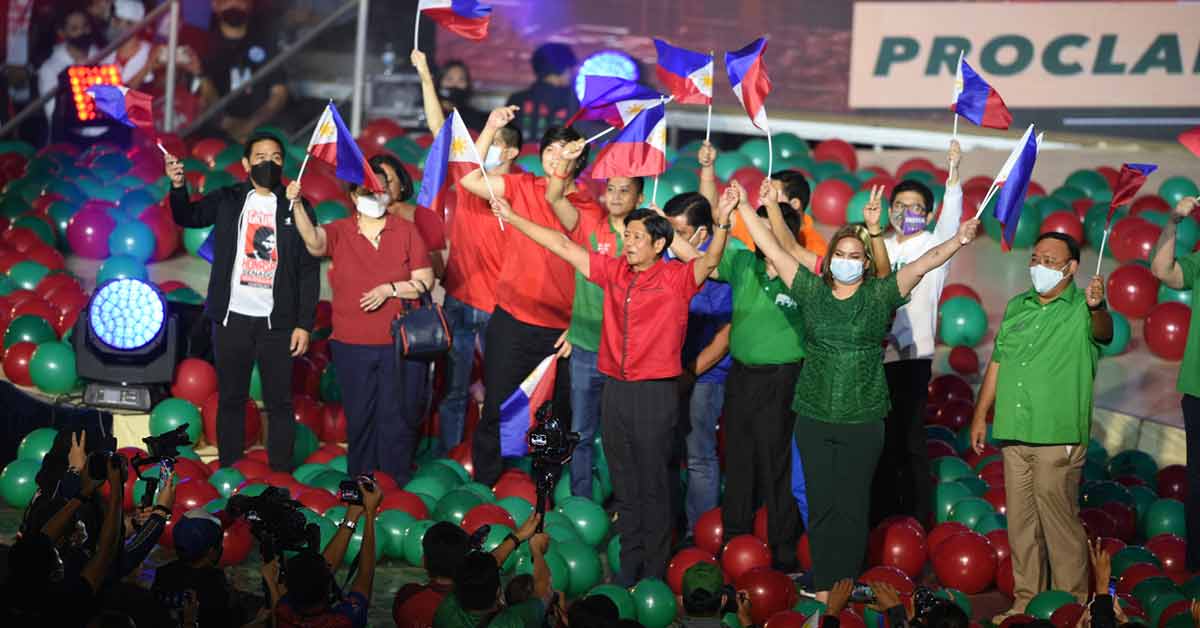The official campaign period for the 9 May, 2022 Philippine elections started last Tuesday (8 February, 2022), though, as early as the last quarter of 2021, hopefuls for national elective posts have already been campaigning. Nevertheless, last Tuesday, candidates running for the May 2022 elections became official candidates.
Since then, election campaigning has been in full swing in the Philippines, where various electoral candidates' proclamation rallies and campaign sorties from presidential aspirants down to candidates for local government are already taking place.
The election fever is more felt these days. The political circus closely associated with elections is much more evident and is expected to intensify as “D-Day” draws near.
Manchurian Candidate?
In the same manner that the election fever is getting heated by the day, the “Amboys” or pro-American personalities who are in many ways associated with the political opposition are not wasting time.
They are peddling and concocting fictitious imagery of former senator and now presidential aspirant, the son and namesake of former President Ferdinand Marcos, popularly known as Bongbong Marcos or BBM, the apparent frontrunner of the 2022 national elections, as the so-called “Manchurian candidate” of China.
A Manchurian candidate refers to a politician who is not loyal to or harms his/her own country or political party because they are under the control or influence of another country or party. A Manchurian candidate is a person, especially a politician, who is used as a puppet by an enemy power.
Such a portrayal of Marcos by his political detractors is based on the impression that among the contenders for the presidency, it is BBM who seems likely to pursue President Rodrigo Duterte’s independent foreign policy and rapprochement policy or constructive engagement with China as opposed to the antagonistic stance of Duterte’s predecessor.
It can be recalled that upon Duterte’s rise to the presidency, he adopted an independent foreign policy, which for the most part has benefited the country economically, security-wise, and even amid the COVID-19 pandemic.
Under the Duterte administration, “independent foreign policy” is established on fostering a broader and differentiated set of relationships solely based on Philippine national interests, designed to maximize the country’s autonomy, security, and prosperity.
Duterte, to a considerable extent, has repositioned the Philippines from a staunch pro-American stance toward a more neutral one pursuing an “independent foreign policy,” intending to find a “geopolitical nonaligned position” or “middle ground” or an “equidistance position between the US and China, where the Philippines remains a friend of the former but at the same time deepens its friendship with China on the economic front. This has positioned the country in a far better situation to advance its interests in an evolving, ever-volatile, and tension-driven regional order.
Under Duterte’s presidency, the Philippines has forged deeper friendly and cooperative relations with China on issues and matters where there already exists mutual and cooperative understanding in areas where the two countries have no disputes or differences such as economics and trade, science and technology, cultural exchanges, and people-to-people exchanges.
The Philippines also tries to resolve its differences and conflict of interests with China more specifically in the South China Sea (SCS) through diplomatic and peaceful means bilaterally and multilaterally within the ambit of ASEAN and the bounds of international laws.
Such a pragmatic foreign policy is not only a prudent and sensible one that BBM is seemingly inclined to pursue but a decision that fosters a win-win scenario for the two countries, the Philippines and China, despite their existing differences over the disputed SCS.
No doubt, it is to the advantage of the Philippines to have a mutual understanding and friendly relations with the economic powerhouse rather than having adversarial relations with the dominant power in Asia and a rising global superpower.
Furthermore, because of Duterte’s foreign policy, to a greater extent, the Philippines thus far was not caught “flat-footed” by the changes in the Asia-Pacific power structure. Despite the noise, posturing, and grandstanding of the US and its aggressive “Pivot to Asia,” or “US Indo-Pacific Strategy” aimed at undermining China economically, politically, and militarily, while declaring that it has a “national interest” in the South China Sea (SCS); the fact remains that China is a rising superpower and change is inevitable and irremediable.
Thus, the Philippines being part of Asia, should not miss the opportunity of being at the heart of Asia’s rise. That could only happen if the country forges deeper economic cooperation and ties with China and the world while resolving differences through peaceful and diplomatic means.
So, who among the presidential aspirants is the epitome and the embodiment of a Manchurian candidate?
Is it BBM who is likely to pursue a similar thread and core principles of an independent foreign policy as mandated by the 1987 Constitution pursued by the Duterte administration based on geopolitical realities, putting the country's core national interests at the helm?
Or is it presidential aspirants like Vice President Leni Robredo, who mimics the US foreign policy stance, expressing fondness for a “rules-based order,” lawfare approach to the country’s differences with China over the disputed South China Sea (SCS), and partiality to the US backed construct of an exclusive alliance or bloc/grouping to counter China’s rise with the likes of QUAD and AUKUS?
The QUAD and AUKUS are nothing more but a narrower, security-centric effort of the US alongside the United Kingdom (UK) and Australia. ASEAN member states like Malaysia, Thailand, Indonesia, and Vietnam are critical, ambivalent, and less likely to support them because it risks fomenting divisions among Asian countries and might potentially provoke a nuclear arms race in the Asia-Pacific region.
Or is it the likes of Senator Manny Pacquiao, another presidential hopeful, who went to the US Embassy in Manila and met with US officials to discuss and seek a thumbs up for his supposed policies and programs for the country on various issues like the SCS dispute, the Visiting Forces Agreement, his massive housing program, and the continuing friendship between the US and the Philippines?
Now, who then is the Manchurian candidate?
Election Meddler?
On the other hand, the likes of Retired Supreme Court Senior Associate Justice Antonio Carpio and former Foreign Affairs Secretary Albert Del Rosario, who are known to be fellows of the political opposition, are likewise assiduous in touting that China may interfere in the upcoming national elections to protect its interests but have no concrete proof whatsoever other than mere speculations.
Carpio said in an online forum that “China will interfere because he thinks they interfered in the last presidential elections.” He further said that he believes China will again favour a candidate who will continue Duterte’s friendship with Beijing. On the other hand, it can also be recalled that Del Rosario claimed that ranking Chinese officials have been bragging that they were able to shape the outcome of the country’s polls in 2016, which led to the election of President Rodrigo Duterte.
But which country has a track record of election interference since the end of World War 2? Is it China or the US?
The book “Meddling in the Ballot Box: The Causes and Effects of Partisan Electoral Interventions” by Dov H Levin, a political scientist at the University of Hong Kong claims that the US is the one to beat when it comes to election meddling. The book asserts that the US has more elections than any other country in the world since the “dawn of the modern era.”
The book also argued that electoral interventions have occurred in the elections of at least 60 different countries of all sizes and populations. The author said that his research found that given the overall number of national elections in each region since 1946, the US has been a bit more likely to intervene in elections in Asia, and thus far, the US has intervened in most elections between 1946 to 2000 – 81 elections in total.
Conclusion
History, as our witness, tells us that great powers have tried for centuries to intervene in elections of other countries through various clandestine means. However, a great power will not intervene unless it is apprehensive that a candidate with very divergent preferences threatens and jeopardizes its interests.
Thus, in the case of the Philippines and the upcoming May 2022 national election, it is imperative to ask the question, which country feels threatened by the possibility of a Marcos come back at the helm of power, given that BBM shows inclinations of pursuing an independent foreign policy and constructive engagement with China like Duterte, which is somewhat divergent to US strategic and security interests in the country and the Indo-Pacific region? Is it China or the US?
Lest we forget, BBM maintained the stand as a senator that the current administration should revisit the Enhanced Defense Cooperation Agreement (EDCA) between the Philippines and US to make sure the Philippines gets the best terms under the agreement.
It can also be recalled that BBM questioned specific provisions in the agreement that disallows access to Filipino personnel. He also cited the need to clarify the equipment used in the exercises and the Americans' facilities. The former senator also stated that there is also a need to spell out the equipment that the Americans will leave behind as payment for using Philippine bases.
BBM also insisted that EDCA increases the rotational presence of US troops in the Philippines and opens the possibility of providing the Americans basing rights in the country.
Hence, which of the two countries then has more impetus and motivation to meddle in the 2022 elections with BBM as the frontrunner of the May 2022 presidential elections? Your guess is as good as mine.
The views expressed in this article are the author’s own and do not necessarily reflect those of The ASEAN Post.

